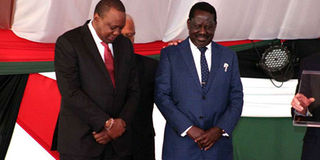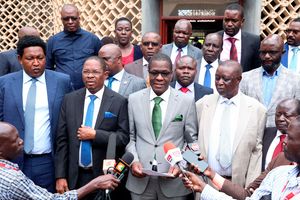Why we must back Building Bridges

President Uhuru Kenyatta (left) and Opposition leader Raila Odinga praying during the Kenya National Prayer breakfast at Safari Park Hotel, Nairobi, on May 31, 2018. PHOTO | FILE | NATION MEDIA GROUP
What you need to know:
- When the Building Bridges Initiative commenced with the handshake, both President Kenyatta’s and Mr Odinga’s supporters welcomed it with a pinch of salt.
- President Kenyatta has shown that he meant what he said and said exactly what he meant.
On Monday, Opposition supremo Raila Odinga was photographed at the offices of the New Partnership for Africa’s Development (Nepad) in Midrand, South Africa, on a visit that was part of a familiarisation exercise for his new role as an African Union envoy.
Predictably, social media was alight with many commending the former Prime Minister for the gusto with which the ODM party leader had embraced the continental position — of course with a few haters putting in their bile.
But the tour Down South also brought to the fore the realisation of the gap between intention and actualisation, also known as action.
Action is what transforms ideas, thoughts and even promises into tangible and believable things. That is what President Uhuru Kenyatta has demonstrated regarding the handshake and his obvious support for his “brother” Mr Odinga.
FOREIGN POLICY
Experts in foreign affairs and foreign policy issues will tell you that, without the lobbying of one’s government, it is practically impossible to secure a high-flying diplomatic role with any continental or international organisation.
Essentially, therefore, the recent appointment of Mr Odinga as AU’s pioneer High Representative for Infrastructural Development must have come after intense lobbying and engagement between Kenya and the AU.
Mr Odinga becomes the fifth AU high representative after former presidents Alfa Konare (Mali), Jerry Rawlings (Ghana) and Pierre Buyoya (Burundi) and former Cape Verde foreign minister Jose Brito.
When the Building Bridges Initiative (BBI) commenced with the famous handshake, both President Kenyatta’s and Mr Odinga’s supporters welcomed it with a pinch of salt. They were unsure what it portended for their political future.
HOSTILITY
At a time when the country was smelling of hostility and the cloud of angst hang over us, the two announced the surprise intention to mend fences.
Whereas that resolved the economic crisis almost immediately, there was predictable unease among the close lieutenants of both gentlemen, who took issues with having been left by the wayside.
Having agreed on seven pertinent issues and set in motion a secretariat to cobble up a document on how to manoeuvre those political and social problems, the country regained its tranquillity.
However, political scientists and strategists have kept waiting for that one moment when one of the two, or both of them, would outfox the other.
And just when no one saw it coming, Mr Odinga received his Christmas-come-early appointment, to the chagrin of the naysayers.
Essentially, President Kenyatta has shown that he meant what he said and said exactly what he meant. He has proven that while it is expected of politicians to be dishonest and to betray almost all political pacts, he opted to be different.
HISTORICAL PROBLEMS
The President has further shown his willingness to confront our historical problems, enlisted in the handshake document, and lay them to rest once and for all.
It takes very few politicians confronting societal injustices that bedevil their nations.
In the handshake document, the issues Mr Odinga raised include enhanced devolution, inclusivity in national jobs and development, negative ethnicity and tribalism, corruption, equity and human rights.
It is hard to tell if the recent accelerated fight against graft is attributable to the document, but it is clear that, without the support of Mr Odinga, it might have been practically impossible for President Kenyatta to achieve much in that vector.
Despite his comparative advantage having been sworn in as Head of State, President Kenyatta chose to reach out to his erstwhile antagonist and listen to him. And no, he did not merely listen but agreed to work on the issues that he raised.
GOODWILL
President Kenyatta then, as a sign of goodwill, ensured that he lobbied for Mr Odinga to share his leadership skills with Africa.
He certainly was objective enough to see some good in his arch-rival.
That is something many politicians would never do — especially if they are Robert Greene’s adherents, who believe in crushing the enemy.
The BBI may be hazy, now but what the President has clearly shown is that his dream of a better, cohesive Kenya will not remain as mere intentions, but he is willing to make them a reality.
If we all appreciate that Kenya’s economic growth is intricately bound to peace and cohesion, then we must all back this initiative and the two gentlemen spearheading it.
Mr Kihoro is a research and data expert. [email protected].





